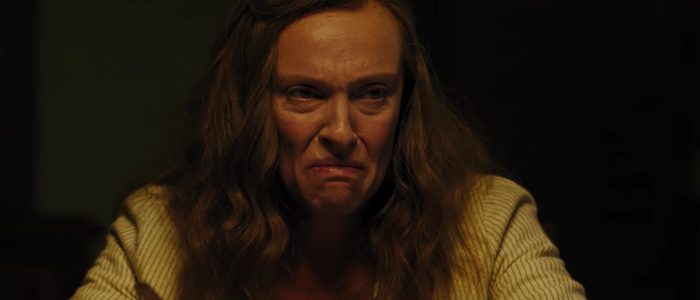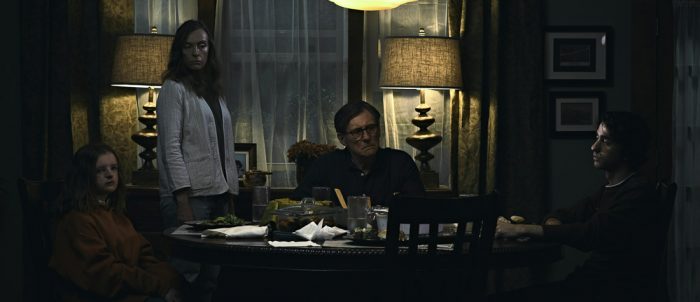Making Sense Of The Terrifying 'Hereditary' Ending
Ari Aster's indie horror film Hereditary is being hailed as one of the scariest movies in recent memory. Aster blends family drama with crushing dread, creating a memorable, horrifying journey. Now that the film is out and most people have had a chance to see it, let's talk about the terrifying Hereditary ending.Major spoilers follow.
A24 did an excellent job marketing their new horror movie Hereditary by keeping audiences in the dark. Trailers for the film were effective and spooky, but they didn't really sell what the movie was about. The marketing for the film reveals a smattering of details: Toni Collette is dealing with the death of her estranged mother, and also contending with supernatural forces in her home. Based on this, I went into Hereditary expecting a haunted house movie. What I got was something completely different. What writer-director Ari Aster has crafted is something more akin to The Exorcist or Rosemary's Baby. There's a supernatural element, but there's also a lot of occult undertones that caught me completely off-guard (in a good way).
All of this is building towards a nerve-jangling ending that had the entire audience I saw the film with practically losing their minds. Before we get to that, here's a basic crash-course in what the film is really about.
Hereditary, Explained
As Hereditary opens, Annie Graham (Toni Collette) is dealing with the death of her mother. We learn through the course of the film that Annie's relationship with her mom was difficult, to say the least. Annie's mother was manipulative, and emotionally destructive, and near the end of her life, mother and daughter were barely speaking to each other – despite living under the same roof.
Strained relationships between parent and child is a running theme in the film. Annie has an uncomfortable relationship with her son, Peter (Alex Wolff) – a child she later reveals she never even wanted. Peter holds his mother at arm's length, and for a pretty good reason – years ago, during a supposed sleepwalking episode, Annie doused the sleeping Peter in paint thinner and tried to set him on fire. Annie has another child as well – thirteen-year-old Charlie (Milly Shapiro). Charlie is the outlier in the family – she keeps to herself, and engages in...questionable hobbies (like cutting the heads off dead birds, for instance). Annie's relationship with Charlie is slightly better than her relationship with Alex, but it's not exactly idyllic. Annie is over-protective of Charlie, while also being somewhat distant. In short, life in the Graham household isn't very sunny.
The oppressive, depressive atmosphere in the Graham home soon turns apoplectic. Annie forces Alex to bring Charlie to a party, and at said party, Charlie consumes some chocolate cake with nuts in it. Sounds harmless, right? Wrong – Charlie is allergic to nuts, and her throat immediately begins to close up. Panicked, Alex throws Charlie in the car and speeds down a dark highway towards a hospital. In the backseat, Charlie, struggling for air, rolls down the window and sticks her head out. As this happens, Alex swerves the car to avoid a dead deer in the road. The car violently veers to the side of the road – and towards a telephone pole. Charlie's face slams into the telephone pole – the force powerful enough to rip her head clear off (cue loud, startled screams in the audience).
Annie is emotionally devastated, and the rift between her and Alex widens. In a grief support group, Annie befriends Joan (a scene-stealing Ann Dowd), who is mourning the death of her son and grandson. Joan eventually draws Annie into conducting a seance to contact the dead grandson – a seance that actually works. Annie quickly tries the seance at home, drawing Alex and her husband Steve (Gabriel Byrne) into the mix. They seemingly make contact with Charlie's ghost – an event that understandably alarms both Alex and Steve.
From here, Hereditary descends into a gleeful madness that I couldn't help smile at (while also being creeped the hell out). Alex is haunted by alarming visions, and Annie grows more and more unhinged. Digging through some of her dead mother's personal items, Annie discovers her mother was the leader of a demon-worshipping cult, and that Joan was a member of said cult. Oh, and Annie's dead mother's headless body is just chilling up in the attic. Annie attempts to rid her family of the demonic forces plaguing them, but that backfires, badly. Steve dies after going up in flames (literally), Annie becomes possessed and starts crawling up the walls in true Exorcist fashion, and Alex attempts to flee this house of hell, only to find more terrifying things awaiting him in seemingly every room.
I can't overstate how effective all this is. I could literally feel the tension in the packed theater as I watched Heredity; I could literally sense the audience growing more and more unnerved and alarmed as Aster ratchets the horror up to 11. That horror never lets up; never relents. There's no hope of help here; just a spiral down into darkness. And that's where the ending comes in.
Hereditary Ending, Explained
All of Hereditary is building towards its big, weird ending. The final minutes of the film have Aster finally tipping his hand and revealing what the heck this is all about. We learn that Annie's mother, Ellen, lead a cult that worshipped the demon King Paimon – a "real" demon first named in the grimoire on demonology Lesser Key of Solomon. Earlier in the film, Charlie comments that her grandmother once said that she wished Charlie had been born a boy. This isn't just a case of grandmother being a jerk – it ties into the cult's plan. The cult wants to resurrect King Paimon on earth by giving the demon a new host body to take over. The cult needs a male host for the demon, but in the past have only been able to get close to the female Charlie.
What's an evil cult to do but set in motion a series of disturbing events? All throughout the film, we see the symbol of Paimon etched into certain surfaces. It's on the wall above Ellen's headless corpse in the attic. And it's also on the telephone pole that decapitates Charlie. In other words, the cult worked its dark magic to kill Charlie – but that was only the beginning of their plan. Joan, another member of the cult, befriended Annie to help her summon Charlie's ghost. Once that was done, the cult hoped to insert Charlie's spirt inside of Alex's body, thus creating a suitable male host for Paimon.
Does any of this make sense? In the real, sane world, probably not. It's a bit confusing, and overwhelmingly weird. But in the world of demonology and the supernatural, the sky is the limit. Aster did extensive research to bring as much "realism" as possible to the occult elements in the film, and that research pays off. One of Hereditary's strengths is how nonchalant it is about its supernatural story elements. They never seem forced, or cobbled together, or random – instead, it all comes across as perfectly logical (in the world of the movie, at least).
"One source leads to another," Aster told Thrillist. "You start with the obvious things like you look up Anton LaVey and Aleister Crowley, and then it gets very disturbing. I'm not tied in any way to the occult, so the research was disturbing, but I knew that I had to go there and I knew that I wanted the ritual elements of the film, which are held at a distance and you only get pieces of them, I knew I wanted them to be rooted in something real. I was lead to witchcraft manuals that are instructing people on how to cast spells and this and that."
"I wanted to make a film that was about a long-lived possession ritual but told from the perspective of the sacrificial lambs," he added to Fandango. "People who don't know what is happening, but it's happening. It's been happening since before the movie started. And so, there's this coven that's kind of circling the family, and they're lingering around the periphery. And every now and then, we feel them, or we see them, but we don't really have any access to them. But, ultimately, this movie is their success story."
In the end, the cult does indeed succeed. Alex becomes possessed by both Charlie and Paimon. Annie saws her own head off, and her headless corpse floats up into the large treehouse nestled in the backyard of the house (it's a weird movie, folks). Alex/Charlie/Paimon follow the floating corpse up into the treehouse, and finds the cult gathered in worship around a ghoulish statue – a statue with Charlie's rotting, severed head placed on top, wearing a crown. Joan takes the crown from off Charlie's severed head and place it atop "Alex"'s head. The cult hails Alex as both Charlie and Paimon. And the movie ends. What comes next? I can only assume Paimon lives large and descends darkness and chaos upon the land, but that's just a wild guess.
It's not the happiest of endings (unless you're a Paimon worshipper), and that might account for the film's polarizing reaction. Many audiences expect certain things from their horror movies, and when the horror movie in question veers down a different path, it can be alarming and confusing. Anyone looking for a happy, reassuring ending is going to come out of Hereditary shocked.
That said, I'll be honest: when you start to really dissect every little element of Hereditary, it doesn't quite work. There are so many moving parts in the cult's plan that even a slight change of events could've derailed everything. In fact, when you get right down to it, the cult's plan is so needlessly complicated that it's almost impossible to make much sense of. But that's okay, because when you're dealing with demon cults, logic kind of goes out the window. Hereditary isn't about applying real-world logic. It's about being completely overwhelmed by the unrelenting power of the supernatural. You can't escape it, and when you try to find comfort in the real, sane world, you come up short. There's no escape here. No respite. No power of good to intervene. How scary is that?


